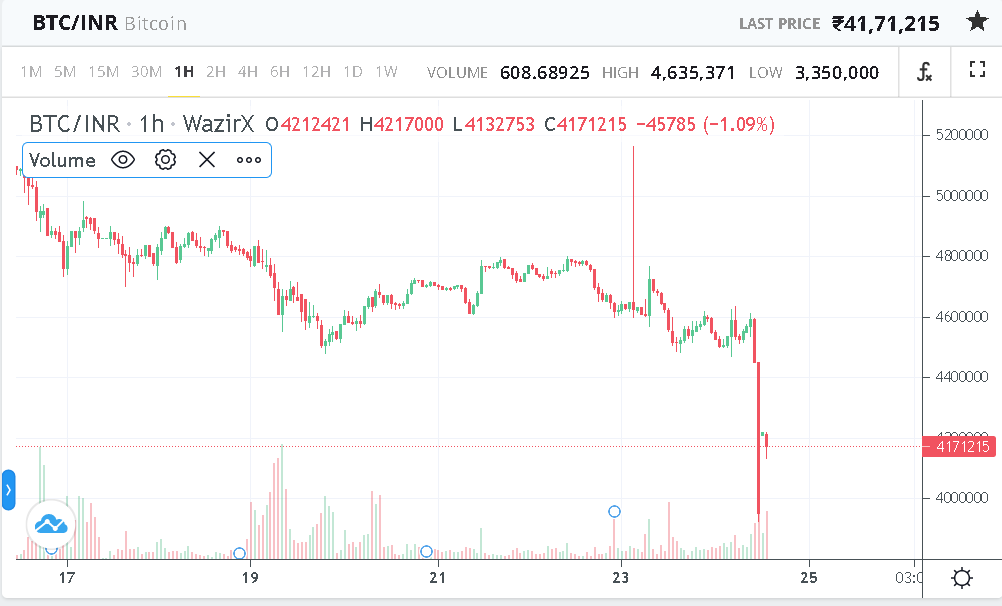The Indian cryptocurrency market experienced a significant tremor recently, sending ripples of panic among investors. What triggered this sudden downturn? The announcement of a new cryptocurrency bill by the Indian parliament, casting a shadow of uncertainty over the future of private cryptocurrencies in the nation. Let’s dive into the details of this market-moving event and understand what it means for crypto enthusiasts in India.
What Sparked the Crypto Market Panic in India?
The Indian government’s plan to introduce ‘The Cryptocurrency and Regulation of Official Digital Currency Bill, 2021’ in the Winter Session of Parliament acted as the catalyst for market volatility. The bill’s objective? To pave the way for an official digital currency issued by the Reserve Bank of India (RBI) while simultaneously proposing a ban on “all private cryptocurrencies.” This announcement, laden with ambiguity, immediately triggered a wave of apprehension and sell-offs across Indian crypto exchanges.
The WazirX Price Crash: A Case Study in Market Reaction
WazirX, a prominent Indian crypto exchange, bore the brunt of this market panic. On November 24th, at 3:30 a.m. UTC, a massive sell-off ensued, causing a dramatic plunge in cryptocurrency prices. Let’s look at the impact on Bitcoin and Ether, two of the most popular cryptocurrencies:
- Bitcoin (BTC): The price plummeted from approximately Rs. 4,600,000 ($61,820.73) to Rs. 3,917,659 ($52,650.55) on WazirX.
- Percentage Drop: This translates to a staggering 14.8% decrease in just two hours.
- Ether (ETH) and Cardano (ADA): Similar to Bitcoin, these altcoins also witnessed significant double-digit percentage drops on WazirX, as reported by Cointelegraph.
Expert Opinions: What Do Crypto Leaders Say?
The proposed crypto ban has sparked widespread debate and concern within the crypto community. Let’s hear what industry leaders are saying about the situation:
Jay Hao, CEO of OKEx:
“India is home to the highest number of crypto owners in the world and the onus lies on the government to protect the interest of a large number of crypto investors in the country.”
Source: WazirX
Jay Hao highlights the significant number of crypto investors in India and emphasizes the government’s responsibility to safeguard their interests. A blanket ban, many argue, could be detrimental to these investors and the burgeoning crypto ecosystem in India.
Caroline Bowler, CEO of BTC Markets:
“The thing with cryptocurrency is that while governments may try to ban it or try to contain it, the very decentralised nature of the technology somewhat prohibits that.
Caroline Bowler points out the inherent challenge in banning decentralized cryptocurrencies. The very nature of blockchain technology makes complete prohibition difficult to enforce effectively. She suggests that banning might not be a viable long-term solution and could even be a step backward for India.
Is a Crypto Ban the Right Approach?
The debate surrounding crypto regulation in India is complex. While the government’s concerns about investor protection and potential misuse of cryptocurrencies are valid, a complete ban may not be the most effective solution. Here’s a look at some key points to consider:
- Investor Protection: Regulation, rather than a ban, could provide a framework for investor protection, ensuring safer trading practices and transparency within the crypto market.
- Innovation and Technology: Banning crypto could stifle innovation in blockchain technology and its potential applications across various sectors.
- Global Trends: Many countries are moving towards regulating and integrating cryptocurrencies into their financial systems, recognizing their potential and seeking to manage risks.
- Decentralization: As Caroline Bowler mentioned, the decentralized nature of crypto makes a complete ban challenging to implement and enforce effectively.
What Should Indian Crypto Investors Do?
In times of market uncertainty, panic selling can often exacerbate losses. Experts advise investors to remain calm and make informed decisions rather than reacting impulsively to market fluctuations. Here are a few pointers for Indian crypto investors:
- Stay Informed: Keep abreast of the latest developments regarding crypto regulations in India. Follow reliable news sources and expert opinions.
- Do Your Research: Understand the fundamentals of the cryptocurrencies you are invested in and the long-term potential of the market.
- Diversify Your Portfolio: Diversification can help mitigate risk in volatile markets.
- Invest Responsibly: Only invest what you can afford to lose and avoid making investment decisions based on fear or hype.
- Have Faith in the System: As the situation unfolds, it’s crucial to have faith in the system and believe that a balanced regulatory approach might emerge that protects both investors and fosters innovation.
Conclusion: Navigating the Crypto Regulatory Landscape in India
The recent market turbulence in the Indian crypto space highlights the significant impact of regulatory announcements on this nascent market. While the future of crypto regulation in India remains uncertain, it’s crucial for investors to stay informed, remain calm, and make rational decisions. A balanced regulatory framework that addresses the government’s concerns while nurturing innovation and protecting investor interests is essential for the sustainable growth of the crypto ecosystem in India. The coming months will be critical in shaping the future of cryptocurrency in India, and all eyes are on how the regulatory landscape will evolve.
Disclaimer: The information provided is not trading advice, Bitcoinworld.co.in holds no liability for any investments made based on the information provided on this page. We strongly recommend independent research and/or consultation with a qualified professional before making any investment decisions.



